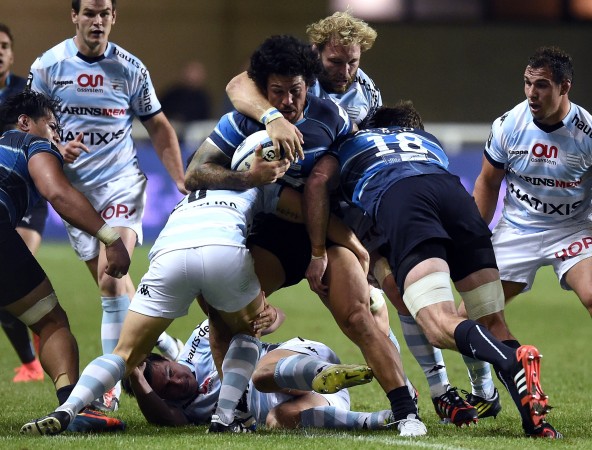Racing Metro came through a rigorous test on their quest for Top 14 glory at the weekend against a combative Montpellier side, so we asked their coaches how they were shaping up for the new season?
Racing Metro are the Parisian club with the big names and the grand plans. A new stadium is under construction and president Jacky Lorenzetti has made no secret of his desire to topple Toulon as Europe’s powerhouse club. And he might just do that this season with a squad that includes Jonathan Sexton, Jamie Roberts and Johan Goosen. But in the galaxy of stars at Racing it’s two down-to-earth Frenchmen masterminding their Top 14 campaign. RW caught up with coaches Laurent Travers and Laurent Labit to find out more.
Laurent Travers, 45, was hooker for Brive when they won the 1997 Heineken Cup Final against Leicester. With Labit he coached Castres in 2013 to their first Top 14 title in 20 years.
Laurent Labit, 46, played full-back for Castres for a decade before his appointment as Montauban coach in 2004. Five years later he and Travers moved to Castres
Rugby World: What pleased you most about Saturday’s away win at Montpellier?
Laurent Travers: Our spirit. We allowed Montpellier to come back into the game but we didn’t crack and we kept our focus.
Laurent Labit: When they had a man sent off [Charles Géli on 40 mins] we knew we’d get a reaction in the second half and we knew the pressure would be on us because of our numerical superiority. But we handled the pressure and that’s a measure of our progress because I’m not sure last season we would have won a game like that.
RW: You’ve been coaching together for ten years so what’s the secret of your partnership?
LT: There’s a perfect osmosis. We each have our area, our way of doing things, and there’s a balance.
RW: Do you play the ‘good cop, bad cop’ routine with the players?
LT: [laughs] I am a bit more impulsive and Laurent is little calmer. But sometimes it’s the opposite. The advantage of having two coaches is that it reduces some of the pressure.
RW: How has French rugby changed since your playing days in the 1990s?
LT: Today there is more intensity, speed and fitness, but perhaps less technique. Clubs spend a lot of time on the physical preparation but perhaps we’ve neglected a little of the technical side, and that’s why the ‘French flair’ has disappeared.
LL: I agree but also think it’s deeper than that. There is a problem with sport in French schools and colleges [there is no organised team sport in the French school system]. In Britain and the southern hemisphere children have opportunities to play all different sports, which is good for developing motor skills. In France you have to join a club outside school to play sports.
RW: What’s best: anonymity in Paris or recognition in Castres?
LT: There are positives and negatives, more so for the players than us. In a small town you have a rapport with the locals and they will encourage you when they pass you in street. In Paris once you leave the club no one knows you. The positive is you can go out for a meal and not be disturbed.
RW: Do the different nationalities bring different approaches to training?
LL: Not really in training but certainly to have players from different countries helps us. We absorb everything and we can then change or modify things if we think we should. Though it’s us who ultimately decide, we discuss a lot with all the international players
RW: How does your recruitment policy work?
LT: We don’t work from a catalogue supplied by agents! Usually it’s opponents we’ve played against for two or three seasons. Perhaps they weren’t ready or able to move then but a little later they say okay and we recruit them. And, of course, we look at our own team, the balance and what areas we think need reinforcing. Usually the president tells us okay, you can recruit four or five players and so we’ll discuss the priorities.
RW: How often do you speak to Jacky Lorenzetti and what’s his influence?
LT: We’re in daily contact with the president and it’s clear: we’re in charge of the sporting side [of the club] and he runs the financial side.
RW: Which of you speaks the best English?
LL: Not me
LT: I understand it better than I speak it. But from next week we both start taking intensive English lessons. French is the priority at the club but I think it’s also indispensable for us to speak English.
RW: Which overseas player speaks the best French?
LT: Francois van der Merwe, who’s been here a few years [since 2008]
LL: More recently, Ronan O’Gara speaks good French and is very important for Racing. He’s a bridge almost between the Anglo-Saxon world and the French because he can communicate so well.
RW: Is all the money flooding into French game good or bad?
LL: I believe it’s good because it allows clubs to build on the long term. Money also brings in big overseas stars and I think that boosts the championship and also benefits French players – particularly young players- because they have so much to learn from these world-class players. Look at Jonny Wilkinson and the effect he had not just on Toulon but also the French players who played with him.
RW: Have you both ambitions to coach France?
LT: I don’t believe anyone if asked would refuse to coach France but we are at Racing and that is our priority. But as coaches wanting to coach at the very highest level then, of course, coaching France would interest us.








